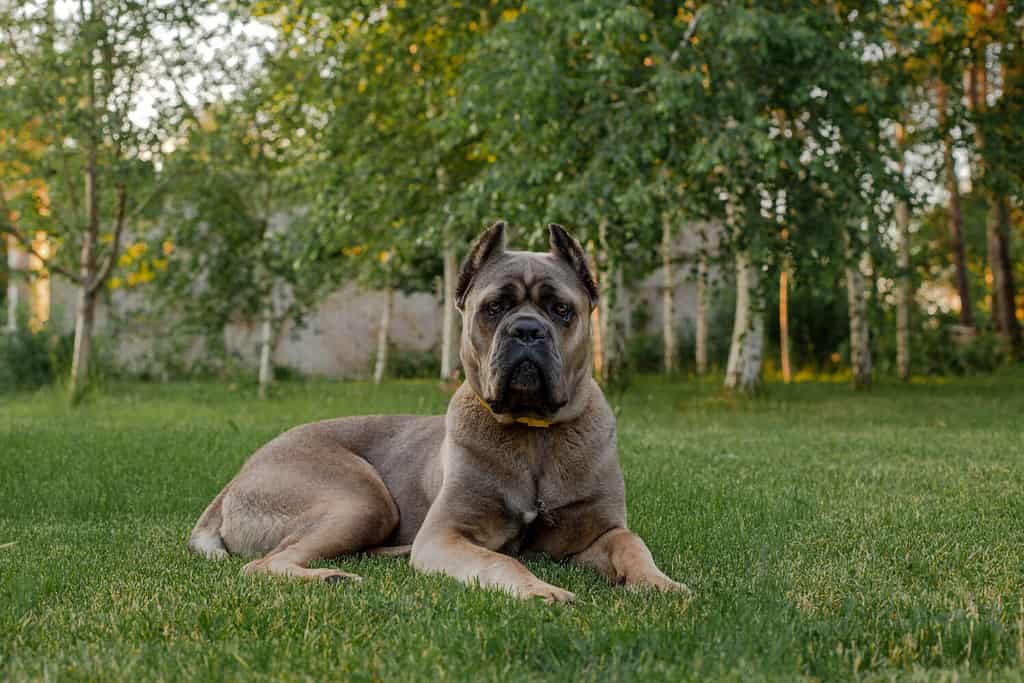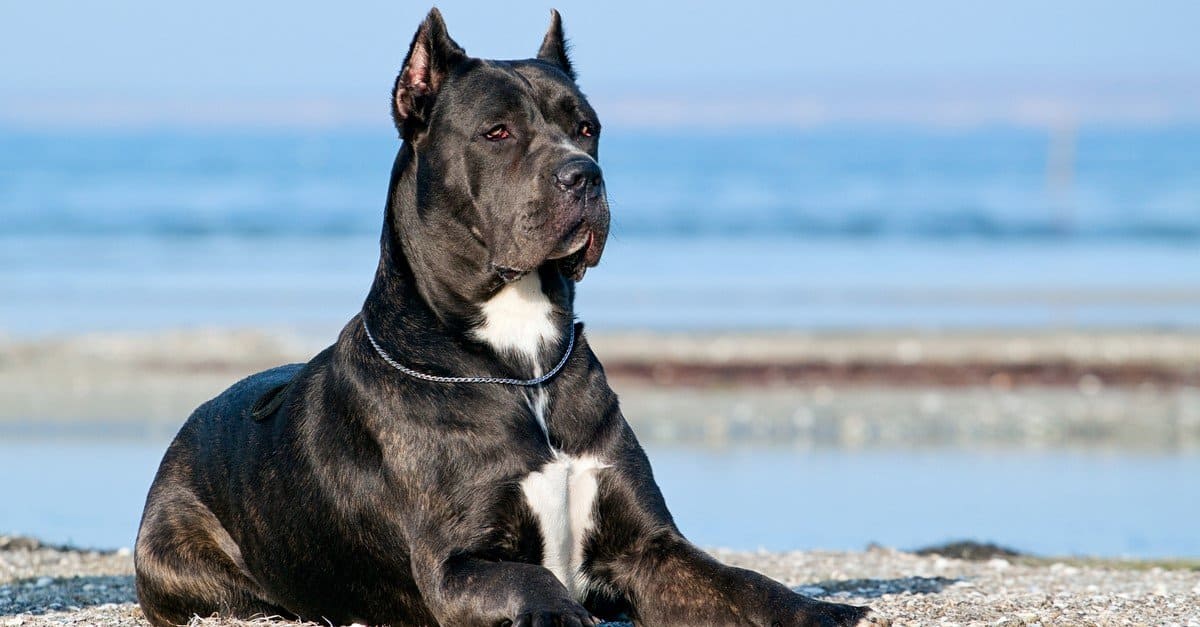Cane Corsos are beautiful dogs that make great pets. While they can be protective, they’re also highly trainable. This “bodyguard-dog,” as its Latin name translates to, is loyal and eager to please its owner. When Cane Corsos get pregnant, as with any other dog breed, they require extra attention and care. Here’s everything you should know about a Cane Corso pregnancy.
Cane Corso Summary
The Cane Corso is an Italian mastiff breed known to be particularly large (weighing up to 110 pounds). These pups are smart and trainable and make great companions, acting as a protector. Cane Corsos used to be used for hunting game and herding cattle, and they’re now often labeled as “guard dogs.” However, you can train this breed to be loving and friendly — making them great family dogs if appropriately socialized. If not, however, they can be aggressive.

Cane Corsos are strong, powerful dogs.
©Samoilova_Olena/Shutterstock.com
Cane Corso Pregnancy Symptoms
Some common symptoms of a Cane Corso pregnancy include lethargy, vomiting, changes in appetite, enlarged or darkened nipples, weariness, and weight gain. These signs typically show up by week four. If you notice these symptoms in your pup, take her to the vet right away so you can confirm the pregnancy and check on the health of the litter.
Gestation Period: How Long Are Cane Corsos Pregnant?
Cane Corsos are typically pregnant for nine weeks or around 63 days. Of course, there’s always the risk of early or late labor, so keep in touch with a vet to ensure you’re taking the right precautions. Additionally, the pregnancy can progress quickly, and it’s important to keep a close eye on your pup and her symptoms to ensure she’s staying healthy. Keep her hydrated, well-fed, and energized with a high protein, nutrient-dense diet.
Pregnancy Care for Cane Corso
If your Cane Corso is pregnant, follow these care tips to ensure a healthy pregnancy.
Keep Your Pup Hydrated
Hydration is crucial to your pup’s health, especially when she’s pregnant. However, because she likely will have an upset stomach, she might not seek the water herself, so make sure to keep track of how often she’s drinking to ensure she does dehydrate.
Feed Your Pup More Protein
Once the pregnancy progresses, you should feed your Cane Corso smaller yet more frequent meals. Include more protein and nutrients in their meals to help sustain their energy, including food like fish, meat, cottage cheese, and milk.
Schedule Vet Visits
Keeping up with vet visits is important to track the progression of your Cane Corso’s pregnancy. Generally, you should schedule a visit by week four to confirm the pregnancy and a few weeks later (mid-pregnancy) to further confirm the size of the litter.
Of course, if your pup exhibits any strange or particularly distressing symptoms, take her to the vet immediately for a professional opinion, necessary medications, or care tips.
Provide a Comfortable Space for Nesting and Whelping
Toward the end of her pregnancy especially, you should provide a comfortable space for your pup to nest and, eventually, whelp. Purchase equipment like a whelping box, whelping pads, and a whelping kit, which often includes a digital thermometer, disposable pads, surgical scissors with blunt tips, antiseptic, and other important supplies.
Average Litter Size for Cane Corso
On average, Cane Corsos give birth to litters of four to six puppies, with some pups delivering slightly more or less. To determine your dog’s litter size, take her to the vet as soon as you notice pregnancy symptoms and ask for an x-ray so you can anticipate the right number of little ones.

Cane Corso puppies are typically calm and easy to train.
©Sbolotova/Shutterstock.com
Cane Corso Pregnancy: Weekly Milestones
On average, a Cane Corso pregnancy last around nine weeks. Here’s what you can expect each week of the pregnancy.
What to Expect in Week 1
During the first week after breeding and fertilization of the eggs, the Cane Corso will experience hormonal changes as the eggs migrate to the uterine horns. However, you likely won’t notice any new symptoms or physical signs of pregnancy yet. Essentially, her body is just preparing itself for the pregnancy.
What to Expect in Week 2
By week two, you likely still won’t notice any major changes in your Cane Corso that might indicate pregnancy, as the embryos have not yet grown. However, if you’re aware your dog is pregnant (and even if you’re not!), look out for any sudden weight gain. An increase in weight in the early stages of pregnancy could lead to health complications.
What to Expect in Week 3
During week three of a Cane Corso pregnancy, the embryos begin developing and are protected in a membrane layer. While you still might not notice any physical changes in your pup, there can be some signs that indicate pregnancy. Early signs include an increase in appetite, upset stomach, or enlarged, darkened nipples.
What to Expect in Week 4
By week four, you should notice symptoms like exhaustion, vomiting, and frequent urination. This will likely push you to take your Cane Corso to the vet to confirm the pregnancy and size of the litter. At this phase, the embryos reach their final state before becoming fetuses, so getting an expert opinion will ensure healthy development.
What to Expect in Week 5
Week five of a Cane Corso pregnancy marks the end of the embryogenesis stage. This is when the fetuses start to develop organs, limbs, and features, causing your furry friend to gain some healthy weight. Depending on your vet’s instructions, you might consider feeding your dog some extra food at this phase.
What to Expect in Week 6
By this stage of the Cane Corso pregnancy, your pup’s litter will continue developing their organs and start forming cells and even claws. While your pregnant pal might not feel up for eating (and might be experiencing more discomfort), it’s best to feed her a higher protein diet to sustain her energy. If your pup refuses to eat, try offering smaller, more frequent meals throughout the day.
What to Expect in Week 7
At week seven, your pup is only a few weeks away from delivery! You can expect her belly to be much larger with fur shedding, and you may even see movement from the little ones. By this point, it’s important to provide your pet with a whelping box (or nesting box), which will keep her safe, warm, and comfortable as she prepares to give birth.
What to Expect in Week 8
By week eight, the pups are fully developed, so your Cane Corso will likely be uncomfortable and irritable. Her nipples might exude colostrum, her hormone levels will change, and she might start showing signs of nesting behavior. Additionally, the litter will likely start moving toward the birth canal at this phase.
What to Expect in Week 9
The last week of pregnancy can be difficult for your pup. She will most likely be distressed and want to be left alone as her body prepares for labor. During this week, ensure your furry friend is as comfortable as possible, and keep a close eye on her for signs of labor.

Be sure to check up on your Cane Corso as she recovers during the postpartum phase.
©xkunclova/Shutterstock.com
How to Prepare for Labor and Delivery
The signs of labor in Cane Corsos include restlessness, panting, nesting behavior, and decreased temperature. Labor and delivery will start with contractions, progress to pup delivery, then end with placenta delivery. While your Cane Corso likely won’t need help whelping, if you find your pup is in serious distress or experiencing prolonged labor, you might consider stepping in or calling a vet.
How to Care for Your Cane Corso Afterward
During the Cane Corso’s postpartum period (which lasts between two to six weeks), your pup will begin tending to and producing milk for her litter. Keep her clean, comfortable, and well-groomed as she is lactating, and provide plenty of water and a balanced diet.
Be sure to keep a close eye on your Cane Corso (and her little ones) to ensure she’s healthy and regaining energy during this stage. If you notice any complications, take your pet to the vet immediately to ensure her hormones are balancing out and that she isn’t experiencing any major changes in her temperament. It’s always best to get an expert opinion.
Ready to discover the top 10 cutest dog breeds in the entire world?
How about the fastest dogs, the largest dogs and those that are -- quite frankly -- just the kindest dogs on the planet? Each day, AZ Animals sends out lists just like this to our thousands of email subscribers. And the best part? It's FREE. Join today by entering your email below.
Thank you for reading! Have some feedback for us? Contact the AZ Animals editorial team.








